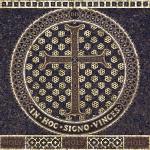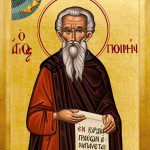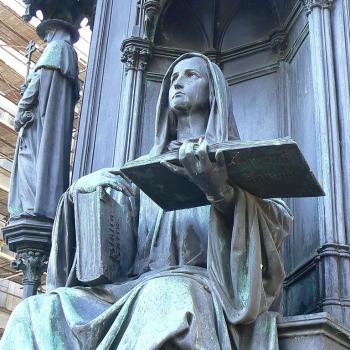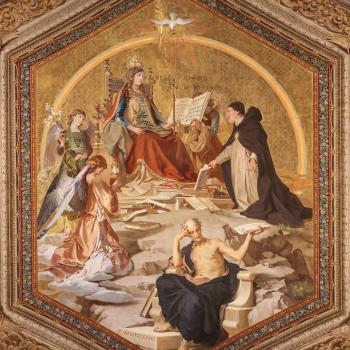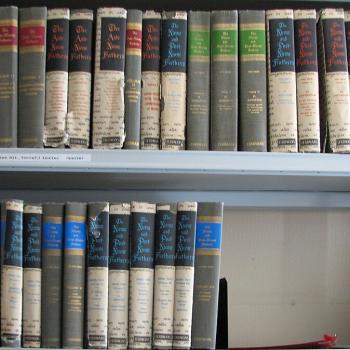
God is one, and that oneness is an absolute, simple, non-composite oneness. God is not composed of parts. The Trinity must not be understood as saying God is made of three different parts: each person is fully God in and of themselves even as all three together represent the same divine fullness.
Creation, likewise, is one, but it is a compounded instead of simple unity: creation can be and is divided into parts. Thus, we can say creation, in its complex unity, points to and represents the greater (and simple) oneness which lies beyond it: the oneness of God. Creation, as an integrated whole, possesses in itself an image and likeness of God through that unity, and through that image and likeness, it is able to direct us from the oneness of creation to the oneness of the Creator who lies beyond it:
Creation, too, is gathered into one, but this unity is composite and manifold and not unoriginate, since it is created. In contrast, the Creator is One, and not only One in terms of producing the harmonization of many and various things into an organic universal unity for one purpose, but also simple because He is Uncreated as the Preoriginate Cause. When the intellect ascents to what is prior, it will eventually reach a One that both designs visible order and originates the genesis of created beings, fusing them into an organic unity and harmonizing them into one; otherwise, it would have to continue ad infinitum, which is absurd. Indeed, for each thing that moves and becomes there must be a time when it was not; and inasmuch as it did not yet exist, it began. [1]
Creation is one, though its oneness is discerned in the way its parts are linked to each other. That is each part is connected to the rest of creation but it also has its own internal composition and essence, and with it, its own particular value and function which differs from the rest of creation. Each part is unique, and has value in and of itself, but the whole also has a value and we must value and support that unity while not disregarding the value its parts. Indeed, the integrity of its particular parts lies in way they are related to the rest of creation, even as that pan-unity which connects each of the parts together finds its value in the diversity of its parts:
On the contrary, total unity as a true unity is, as we have seen, the unity of unity and diversity: a unity which not only embraces all its own parts and points but also inwardly permeates them in such a way that it is also contained as a whole in each part and point. Thus, each point of being, though it has all else outside of itself, nonetheless in its place and in its way is the whole itself, total unity itself. [2]
Individualization attempts to deny the pan-unity which connects all creation together by having the parts separate from each other and stand on their own. Since nothing in creation can be independent in this fashion, as all the parts need each other for their own stability, such individualization weakens the integrity of creation and with it the integrity of each of the parts themselves. Any and all attempts of a particular part, such as a particular person, trying to elevate themselves over and above the whole so that they think they can stand apart from the whole without need for it demonstrates a dangerous stand, one permeated with pride. It is a stand which we can see as forming the basis of the cosmic fall (represented not only in the way Satan fell from grace, but also the way humanity believed it could be like god).
Individualism, with its attempt to break apart and destroy the bonds which connect everyone together in society (and the rest of creation), is, as Florensky noted, a great sickness which would have confused ancient humanity:
Individualism, i.e., nominalism, is the sickness of our time. It is only through great exertion that ancient man could see what was isolated and individual; and only sinning could produce in him a sensation of the latter. He viewed individualism as an act of deliberate separation, splitting off, and he considered it a fault, adikia, an injustice, as Anaximander called it. [3]
Sin corrupts created being, and as it does this, it destroys the bonds which connect everyone together. The more it is embraced, the more created being itself is broken apart and demolished into “atoms.” This is why the more a person sins, the more wounded they become (even if they do not recognize this because of the way their sin has blinded them). Sin encourages us to separate ourselves from the rest of creation, from the unity which we are supposed to have with it which allows us to see and understand more of the One in whose image creation was established. Without that connection, we find ourselves as it were in a darkness of our own making.
Individualization, thus, tries to have each person become their own god, supporting themselves with their own self-generated light, but since they are limited in potential and ability, that light is rather dark; in the end, they find themselves in a darkness which they confuse as being light but which will show itself to be darkness if and when they ever encounter the true light of God. As Origen indicated, this happens to all, no matter how great our potential is: that is, whenever we separate from the whole and try to rely upon ourselves without the need of others, especially God, we will be in darkness (even as the great angelic beings which fell, despite all their greatness, despite their great intellectual ability, found themselves in a darkness which does not know the light of grace):
All who are separated from the one who said, “I am the light of the cosmos,” are darkened. But among those who are darkened, some are human beings and are on earth; they are the “darkened ones of the earth,” but others, sinners outside of bodies – I speak of the demons and evil spirits and souls of the unjust and those underground— are “darkened ones,” but not “of earth,” but, if one must speak in a bold way, “of the underground.” But perhaps these are darkened ones of the air, concerning whom the Apostle speaks, “in which you once walked about according to the age of this cosmos, according to the ruler of the authority of the air, the spirit now motivating the children of unbelief.” [4]
The fall, sin, shows itself all attempts to deconstruct creation, to make all the relative, relational parts independent from each other through individualization. Darkness ensue. Nonetheless, God, who is all loving and good, continues to offer the light of grace, and by that grace, to heal all the damage done by sin so that everything can be brought back together as one. Thus, the work of Christ is to restore all that sin has damaged or destroyed, including and especially the unity of creation, so that in the eschaton, creation, restored to its integral unity, can be united with God in such a way that God can be all in all (cf. 1 Cor. 15:20 -28). What sin corrupts and destroys, Christ heals. Thus sin, establishing the nihilistic power of death, is brought to an end, and with it, an end to the kind of death which it established, a death which represents the way sin vivisects and destroys all forms of being as the method by which it tries to annihilate created being from existence. Christ came face to face with death and overtured it by making death face itself and deconstruct itself, undermining its power and ability to destroy being. By conquering death from within, Christ revered the effects of the fall so that the kingdom of God can be revealed, a kingdom which shows Jesus at its center, acting the bridge who weds together creation and the Creator in a bond of love. The oneness of God merges with the oneness of creation to that creation is deified, partaking of the divine life, but this is only possible once the oneness of creation is fully restored.
[1] Saint Kallistos Kataphygiotes, “On Union with God and The Contemplate Life“ in The Philokalia. Volume 5. Trans. Anna Skoubourdis (No location, Australia: Virgin Mary of Australia and Oceania, 2020), 215 [ Greek terms used in parenthesis in the translation have been removed].
[2] S. L. Frank, The Unknowable: An Ontological Introduction To The Philosophy of Religion. Trans. Boris Jakim (Brooklyn, NY: Angelico Press, 2020), 114.
[3] Pavel Florensky, The Meaning of Idealism: The Metaphysics of Genus & Countenance. Trans. and ed. Boris Jakim (Brooklyn, NY: Semantron Press, 2020), 65-6.
[4] Origen, Homilies on the Psalms: Codex Monacensis Graecus 314. Trans. Joseph W. Trigg (Washington, DC: CUA Press, 2020), 217 [Homily 3 on Psalm 73].
Stay in touch! Like A Little Bit of Nothing on Facebook.
If you liked what you read, please consider sharing it with your friends and family!


